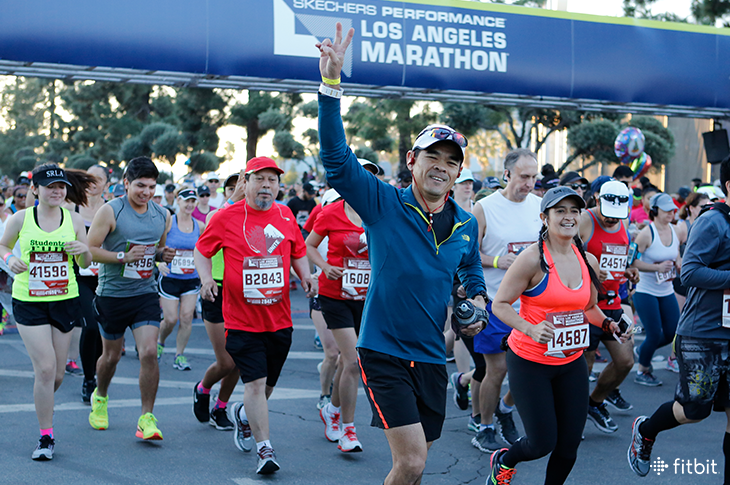
You’ve been sweating through the miles, hitting the hills, and finally, the marathon is just a week or two away. Healthy eating has likely been part of your training plan all along. But in those last few days leading up to the big race, you’re probably extra focused on fueling up—and maybe even a little nervous about how your stomach will perform under pressure. Which foods will help you go the distance?
What to Eat Before Running a Marathon
“The easiest way to think about this is, don’t do anything drastic or crazy!” says Lauren Antonucci, MS, RDN, CSSD, CDE, CDN. “Then repeat that mantra several times throughout the week. Most runners overload on carbs before a race. While you absolutely want to stockpile a few extra carbs, pounding huge plates of pasta and bagels will only leave you feeling sluggish.”
The moderate approach: Adjust the balance of your plate, and take tapering into account. During the most intense part of your training, you really need to fuel up for long runs. But as you start reducing your miles, both your carbs and total calories should gradually decrease, as well. In the last couple of weeks, Antonucci reduces carbs by a rule of thirds, and in the last couple of days, she also lightens up protein. At that point, your muscles should be rested, so it’s less protein for recovery, more carbs for quick energy at the starting line. Here’s the breakdown:
- Two weeks before the race: Reduce carbs by about one-third.
- One week before the race: Reduce carbs by a little less than one-third again.
- Two days before the race: Reduce protein by about one-half, and replace that portion with carbs. Avoid high-fiber veggies and carbs.
- The night before the race: Skip protein at dinner entirely.
- The morning of the race: Eat!
It’s all about maintaining consistency with how you’ve been eating throughout training. Rather than recommending a specific menu, the best pre-race plan is personal. So take a deep breath, reflect on how you’ve been eating the past few months, and focus on familiar foods that sit well in your stomach. Still scratching your head about what to make for breakfast, lunch, and dinner? Here’s what it might look like.
Breakfast: Oatmeal with blueberries & walnuts. During training, Antonucci recommends adding protein to your oats with plain yogurt, cottage cheese, or even eggs. As your training tapers and your miles ease down, reduce the portion of oats. In the last couple of days, don’t add any extra protein, and up that fruit slightly.
Lunch: A turkey sandwich on whole-wheat bread. Your standard deli sandwich has a thick hunk of meat in the middle, which is great for recovery after long runs, but probably too much for taper week. Pull apart your sandwich and pick off all but a few slices. Or just eat half the sandwich, and in the two days leading up to the race, bump up the carbs with a banana or pretzels.
Dinner: Pasta with chicken & broccoli. Yes, pasta is still the pre-race classic! But don’t overload. You can easily eye putting about a third less pasta on your plate. Serve it simply with grilled chicken and steamed broccoli, with a squeeze of lemon and a sprinkle of parmesan, if you like. In the last day or two, ditch the chicken entirely and increase the pasta portion slightly, or serve it with bread or fruit.
The Day Before: Cut Raw Veggies & Fiber
You might be surprised that Antonucci isn’t the biggest fan of salad—at least not in the 48 hours leading up to a race. The day before, she recommends avoiding raw vegetables and high-fiber foods, which could lead to GI distress. Nix the beans, granola bars, bran cereal, and high-fiber crackers. Go easy on dairy, as well, unless you know you can tolerate it. When you go to grab your bib, resist the urge to take dozens of free samples for anything new—you don’t know how your stomach will react. But interestingly, Antonucci doesn’t sweat a little sugar or booze. “I don’t care (and neither should you or your muscles) if you have one glass of red wine with dinner, or sneak a small handful of candy,” she admits. “So long as you’re well hydrated, that’s no big deal.”
The Night Before: Travel & Eating Out
If you’re traveling, part of the stress is losing control outside the comfort of your own kitchen. Lots of runners pack their own breakfasts and snacks, or swing through a grocery store as soon as they hit the ground. The night before the race, you can always stay in and order room service from the hotel. Find the most familiar item on the menu, even if you feel a little lame ordering pancakes for dinner or the pasta from the kiddy menu! But whatever you do, make your friends, family, and cheering crew come to you. Fabulous dinner reservations can wait for after the finish line, when you’re ready to celebrate.
The Morning of: Make Sure You Eat Enough
The one last mistake runners make? “Eat a real breakfast!” says Antonucci. “I don’t want to hear that you’re only having a banana—that better be a banana, bagel, and peanut butter.” For the races that start late, like Boston and New York, she tells her athletes to eat a second breakfast. To be safe, eat at least two hours before the race. So rise, shine, eat your favorite breakfast for before long runs, and get ready to rock this thing. Those porta-potty lines can eat your dust.
Note: While the advice presented in this article is sound and research-based, you know your stomach best. There are many different eating plans that can help you prepare for a marathon. Be sure to choose the one that you know will work for you.
This information is for educational purposes only and is not intended as a substitute for medical diagnosis or treatment. You should not use this information to diagnose or treat a health problem or condition. Always check with your doctor before changing your diet, altering your sleep habits, taking supplements, or starting a new fitness routine.

If you have questions about a Fitbit tracker, product availability, or the status of your order, contact our Support Team or search the Fitbit Community for answers.
Please note: Comments are moderated and may not appear immediately after submission.